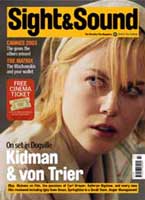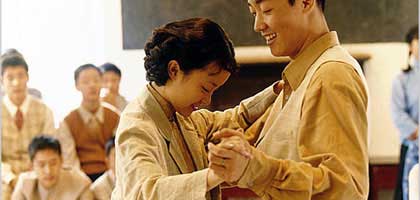
Springtime in a Small Town
China/Hong Kong/France 2002

Reviewed by Philip Kemp
Synopsis
Our synopses give away the plot in full, including surprise twists.
A country town in southern China, 1946. Zhang Zhichen (Xin Baiqing), a doctor from Shanghai, pays an unexpected visit to his old schoolfriend Dai Liyan (Wu Jun), whom he hasn't seen for ten years. Liyan is now married, but no longer has sex with his wife Yuwen (Hu Jingfan) as a result of his poor health. Zhichen recognises Yuwen as the woman he had a brief but passionate affair with ten years earlier. They still feel strongly attracted to each other. Arriving home from school, Liyan's teenage sister Xiu is delighted to see her 'big brother' Zhichen. Yuwen and Zhichen acknowledge their mutual attraction but strive to resist it.
Suspecting that his illness is less serious than he believes it to be, Zhichen encourages Liyan to get more sunshine and fresh air. Increasingly drawn to Yuwen, Zhichen suggests that the time has come for him to leave, but Liyan won't hear of it and proposes that Zhichen sets up a practice in the town using a room in his house. He also suggests to Yuwen that Zhichen might make an ideal husband for Xiu. On Xiu's sixteenth birthday everybody gets rather drunk and as they lose their inhibitions Zhichen and Yuwen's mutual attraction becomes obvious to all.
Zhichen insists that he must return to Shanghai, but Liyan begs him to stay as he makes Yuwen so happy. That night Liyan takes an overdose; Zhichen saves him. With Liyan recovering, Zhichen finally leaves for the city, promising to find a university place for Xiu.
Review
Springtime in a Small Town is Tian Zhuangzhuang's first film as director for ten years. In 1985 his third feature, Horse Thief, gained wide critical acclaim and established him alongside Chen Kaige and Zhang Yimou as a leading member of the 'Fifth Generation' of Chinese film-makers. But his 1992 film The Blue Kite, a semi-autobiographical family saga exposing the brutalities and idiocies of official Party policy under Mao's regime, aroused the fury of the Chinese authorities and Tian was blacklisted. In the interim he's been active as a producer, furthering the careers of younger directors.
The impression is that with Springtime Tian, understandably enough, is playing it careful. Where The Blue Kite deployed a large cast, spanned more than two decades and carried a fierce political message, Springtime is a small, intimate chamber-piece with a cast of five, taking place over a few days and avoiding any overt political allusions. What's more, it's a remake of a much-loved classic film of the same title, made by veteran director Fei Mu in 1948. Differences between the two films are chiefly a matter of emphasis. Where Fei presents the story mainly from the point of view of Yuwen, the wife, with her voiceover shaping the narrative, Tian maintains a sympathetic equidistance; and husband Liyan's illness in the remake is more psychosomatic than physical. If the two films feel very different in texture, it's not simply the shift from monochrome to colour: unlike Fei, Tian shot almost entirely on location.
As in the original, the story's set in that brief, uneasy intermission between the end of the Japanese wartime occupation and the Communist takeover. The sense of transience hangs over the film - this is a world battered and dying, soon to be swept away on the tide of history. Yuwen and Liyan's house and indeed the whole town lie half-ruined by Japanese bombs, and Liyan, old beyond his years, cared for by the aged family servant, identifies with these shattered structures. ("My health, like this house, is beyond repair," he tells Zhichen, the old schoolfriend who visits from Shanghai.) The attraction Yuwen feels for Zhichen isn't solely erotic; for her, fading and dispirited in this moribund world, he and her bright young sister-in-law represent the freshness and youthfulness that are being drained from her. The ending, though it makes dramatic sense in the context of the period, feels like a defeat. Zhichen leaves, returning to the city, while Yuwen resigns herself to the ailing past and her embroidery.
Tian sends his camera gliding and drifting in long, elegant takes through the shadowy corridors of the old house, quietly watching Yuwen and Zhichen as they manoeuvre cautiously around each other, or following Liyan with discreet compassion as he wanders weeping through the darkened courtyard. His DoP is Mark Lee (Li Pingbin) who also co-photographed In the Mood for Love, and Springtime has something of the same mood of exquisitely pained renunciation that suffused Wong Kar-Wai's film. But at other times it's Satyajit Ray who comes to mind, in scenes of intense emotion barely restrained by social formality - Charulata in particular or, in Tian's superbly staged drinking-game scene (shot, amazingly, in one unbroken six-minute take), the word-game sequence from Days and Nights in the Forest.
This is a sensual, haunting film, atmospheric and moving, full of melancholy and a subtle eroticism, and Tian draws beautifully nuanced performances from his unknown cast. (All four principal actors are making their big-screen debuts.) Now and then one gets a sense of the director reining himself in, painting a miniature when his talents are crying out for the bold sweep of a fresco. But if Tian is easing himself cautiously back into direction he has good reason to do so; and any misgivings he may have had ("I hadn't made a film in so long, and I was afraid I'd lost the ability") should have been thoroughly dispelled by the warm reception Springtime has enjoyed.
Credits
- Director
- Tian Zhuangzhuang
- Producers
- Li Xiaowan
- Bill Kong
- Ting Yatming
- Screenplay
- Ah Cheng
- Based on the story by
- Li Tianji and on the 1948 screenplay by Fei Mu
- Director of Photography
- Mark Lee Pingbin
- Editor
- Xu Jianping
- Production Designer
- Cheng Guangming
- Music
- Zhao Li
